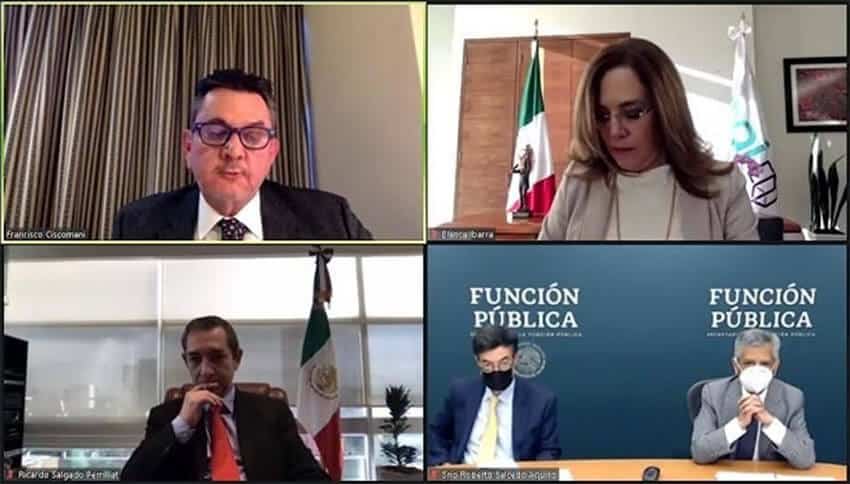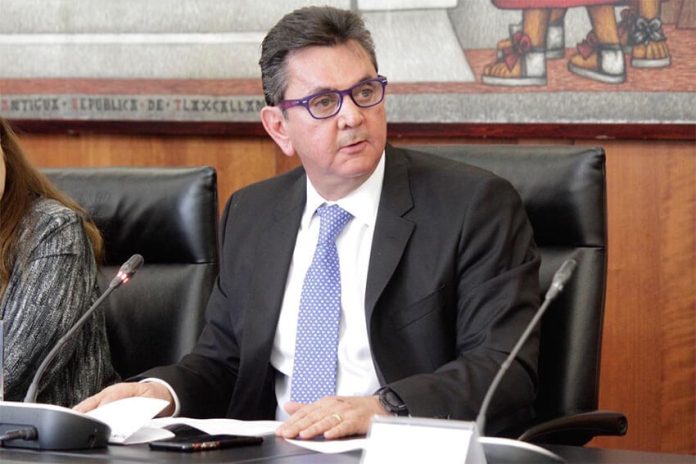A National Anti-Corruption System (SNA) official has called on President López Obrador to rethink a plan to get rid of one of its key components.
López Obrador intends to send a bill to Congress proposing the abolition of the Executive Secretariat of the SNA, an autonomous federal entity whose role is to coordinate the different institutions that make up the anti-corruption system.
Among those institutions are the Ministry of Public Administration, the National Institute of Transparency, the Federal Auditor’s Office and the Anti-Corruption Prosecutor’s Office.
The Executive Secretariat of the SNA has a budget of 123.2 million pesos (US $5.9 million) for 2022. Savings generated by its elimination would likely go to the funding of the federal government’s social programs.
Francisco Ciscomani, president of the SNA’s coordinating committee and citizens participation committee, said Thursday that he was worried about the president’s plan given the Executive Secretariat is the “pillar” of the anti-corruption system.
While “the president’s intention to send this money to social programs is laudable, the work of the Executive Secretariat is indisputable and necessary to solidify the National Anti-Corruption System,” he said at an online SNA meeting on Thursday evening.
Ciscomani noted that the secretariat’s budget was cut by more than 40% last year as part of the government’s austerity drive and its workforce was reduced by 20%. Yet it remains an “efficient institution” that has contributed to the construction and defense of the SNA, he said.
“… The citizens participation committee is going to … respectfully ask the president to … rethink the [plan to dismantle the Executive Secretariat] and to allow the work of this branch [of the SNA] to continue,” Ciscomani said.
He called on the attendees of the virtual meeting, among whom was Public Administration Minister Roberto Salcedo, to urge López Obrador to rethink his plan, but none committed to doing so.
María de la Luz Mijangos, head of the Anti-Corruption Prosecutor’s Office, was the only attendee to respond to Ciscomani’s exhortation, but she was non-committal, asserting she wasn’t in a position to comment on the matter.
Eduardo Bohórquez, Mexico chief of the international nonprofit organization Transparency International, questioned why López Obrador – who has made combatting corruption the central objective of his government – wants to get rid of the Executive Secretariat when it is a “small, efficient body” that coordinates the anti-corruption actions of the various public institutions.

“… Like all administrative and government bodies it could be improved but if we analyze its cost in relation to its benefits, [we see that] it would be more expensive to eliminate it than to strengthen it,” he told the news website La Silla Rota.
Khemvirg Puente, a political science academic at the National Autonomous University who specializes in transparency and legislative issues, asserted that the only thing that abolition of the Executive Secretariat would achieve is to “hinder” the SNA.
He noted that the secretariat is not mentioned in the constitution and therefore the president’s proposal to eliminate it could pass Congress with the support of a simple majority, which the ruling Morena party and its allies have in both houses.
Without the secretariat, “what entity or area will be in charge of following up on the implementation of anti-corruption policies?” Puente asked.
In the president’s opinion, he said, the fight against corruption shouldn’t “necessarily involve organized civil society and other actors” outside the federal government.
López Obrador has long faced criticism for seeking to concentrate power in the federal executive.
He indicated more than a year ago that his government was planning to incorporate autonomous organizations into federal ministries in order to save money and avoid having more than one body doing the same thing.
“… We have to review all these bodies so that there is no duplication [of responsibilities] because we have to save, be efficient, not have so many apparatuses that eat up the budget,” he said in early January 2021.
The president’s critics say that he wants to concentrate government power while getting rid of autonomous organizations that might expose corruption or shortcomings in his administration.
López Obrador’s bill proposing the elimination of the SNA’s Executive Secretariat would also result in 16 autonomous organizations being absorbed into government departments. The newspaper Reforma, which has seen the initiative, listed the organizations that would be affected.
Among them are the National Council to Prevent Discrimination, which would be incorporated into the Interior Ministry; the National Institute of Ecology and Climate Change, which would become part of the Environment Ministry; and the National Institute for the Elderly, which would be absorbed into the Welfare Ministry.
With reports from La Silla Rota, Milenio and Reforma
